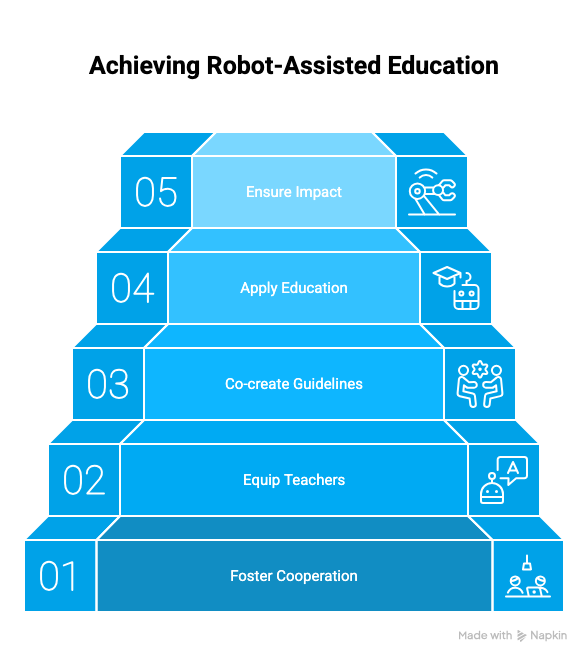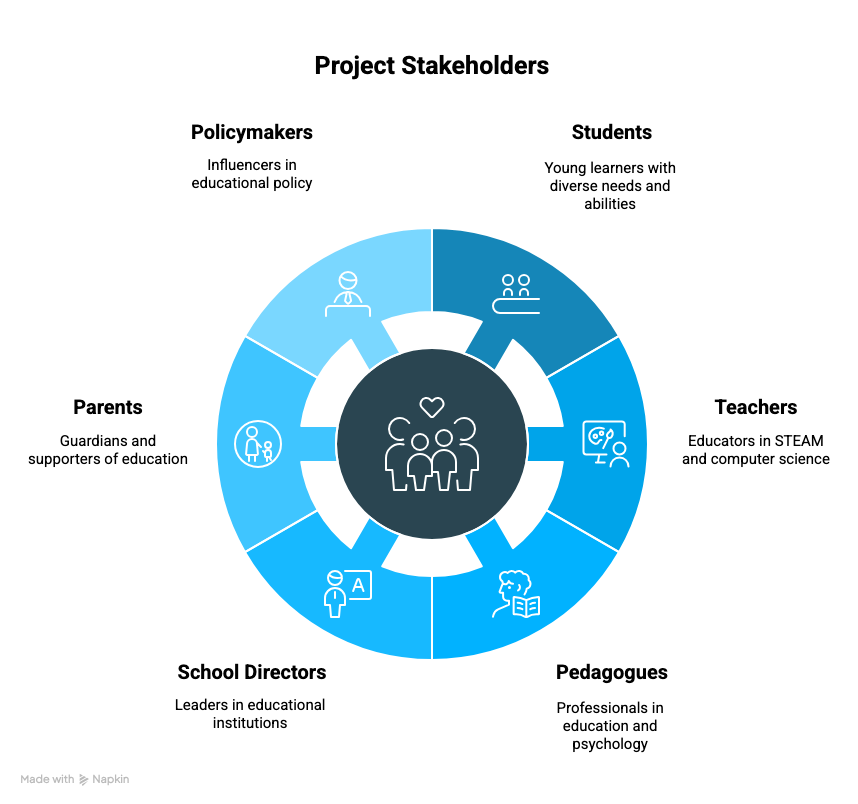My Robot, My LearnMate
Programme: Erasmus+
Action Type: KA220-SCH – Cooperation partnerships in school education
Duration: 01/09/2024 – 31/08/2027 (36 months)
About the Project
My Robot, My LearnMate is a three-year Erasmus+ project that brings together schools, universities, and educational organizations across Europe to transform the way we teach and learn with the help of humanoid robots. The project responds to the urgent need for digital transformation in education, preparing students and teachers for a future shaped by robotics, artificial intelligence, and sustainability challenges.
By integrating the humanoid robot NAO into classrooms, the project promotes innovative teaching methods, fosters interdisciplinary learning, and supports the development of key competences needed for the 21st century. At the same time, it emphasizes inclusion, sustainability, and international collaboration.


Why This Project?
Education today faces unprecedented challenges. In the era of the fifth industrial revolution, automation and robotics are reshaping the labor market and everyday life. Schools must equip students not only with knowledge, but also with the ability to think critically, solve problems, and adapt to constant change.
However, studies show that while only a small percentage of people create and control technologies, the vast majority remain passive users. My Robot, My LearnMate aims to change this trend by introducing humanoid robots at an early educational stage. Through playful and hands-on experiences with NAO, students learn programming, problem-solving, creativity, teamwork, and sustainable thinking.
Objectives
The project has five main objectives:
- Strengthen cooperation between higher and primary education to co-create innovative approaches for robot-assisted learning.
- Equip teachers with the knowledge and skills to integrate humanoid robots into the classroom.
- Develop teaching scenarios, guidelines, and materials for inclusive, sustainable, and systematic robot-assisted learning.
- Prepare students with digital, social, and emotional competences for lifelong learning, future jobs, and internationalization.
- Ensure impact and sustainability of project results through dissemination and long-term implementation.

Key Priorities
The project directly addresses three Erasmus+ priorities:
- Digital transformation – building digital skills, resilience, and readiness in education.
- STEM/STEAM promotion – encouraging interest and excellence in science, technology, engineering, arts, and mathematics, especially among girls.
- Inclusion and diversity – supporting students with fewer opportunities by removing educational, social, and geographical barriers.
Additionally, the project aligns with the European Digital Education Action Plan (2021–2027), the European Green Deal, and the vision of the European Education Area.
Activities
The project is structured into several work packages:
- Teacher training: empowering teachers with practical skills to use robots as teaching assistants, focusing on inclusivity and STEAM education.
- Development of teaching scenarios: co-creating innovative learning materials on robotics, AI, and sustainability.
- Piloting and testing: implementing educational modules in real classrooms, collecting feedback, and refining materials.
Throughout the project, schools and universities will collaborate closely to design, test, and improve educational innovations.

Expected Results
Tangible results:
- Open online training programs for teachers.
- Open online educational modules for students.
- A handbook of methods and good practices for using NAO in education.
- Innovative teaching scenarios for sustainability and climate change education, available in English, Croatian, Polish, Portuguese, and German.
Intangible results:
- Improved teaching methods.
- Increased student motivation, engagement, and digital competences.
- Stronger inclusive culture and empathy.
- Enhanced cooperation and teamwork skills.
- Future-proof education that prepares students for life and work in the digital era.
Target Groups
The project addresses a broad range of stakeholders:
- Students (10–15 years old), including students with special needs and learning difficulties.
- Teachers of STEAM subjects, computer science, and all interested educators.
- Pedagogues, psychologists, and special education teachers.
- School directors and educational staff.
- Parents, policymakers, and wider stakeholders.

Partnership
The consortium brings together partners from four European countries:
- First Primary School Čakovec (Croatia)
- University of Zagreb – Faculty of Organization and Informatics (FOI) (Croatia)
- Center for Training and Education Čakovec (Croatia)
- Społeczna Szkoła Podstawowa im. Unii Europejskiej w Zamościu (Poland)
- Berliner Hochschule für Technik (Germany)
- Agrupamento de Escolas de Mangualde (Portugal)
- Escola Básica com Pré-Escolar Dr. Eduardo Brazão de Castro (Portugal)
Together, these partners will co-create innovative, inclusive, and sustainable ways to bring humanoid robots into European classrooms.